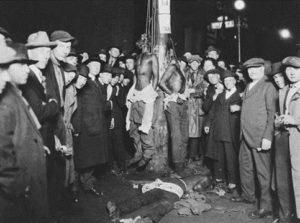Reprinted from Consortium News

The lynching of Elias Clayton, Elmer Jackson and Isaac McGhie in Duluth, Minnesota, June 15. 1920.
(Image by Post card photo) Details DMCA
The almost daily reports of police killings of African-Americans and resulting community outrage have shined a light on persistent racism in the United States. Yet, in the first presidential debate, Donald Trump was asked what he would do to heal the racial divide and replied: "Bring back law and order."
He added that the use of stop-and-frisk in New York and Chicago "worked very well" and "brought the crime rate way down."
But, as reported in the New York Times, "about 90 percent of the people who were stopped were young black or Latino men who had committed no crime whatsoever, according to police data. Of those few who were arrested, the vast majority were charged with nothing more serious than possession of marijuana, not having guns."
When debate moderator Lester Holt noted that stop-and-frisk had been ruled unconstitutional in New York because it "largely singled out black and Hispanic young men," Trump disagreed.
In fact, U.S. District Judge Shira Scheindlin ruled in the 2013 case of Floyd v. City of New York that New York's stop-and-frisk program violated the Fourth Amendment's prohibition on unreasonable searches and seizures since they were conducted without reasonable suspicion. It also violated the Fourteenth Amendment's Equal Protection Clause because the stops and frisks were racially discriminatory, the judge found.
Darius Charney, lead attorney for the Center for Constitutional Rights in Floyd, said, "Stop-and-frisk, as practiced by the NYPD up until 2014, was at its root about equating blackness with criminality and dangerousness, which is exactly the same kind of thinking that has led to all of the horrific and avoidable police shootings of people of color that have captured the nation's attention over the past few years."
Before the debate, Trump had said at a rally that "African-American communities are absolutely in the worst shape that they've ever been in before. Ever. Ever. Ever."
Trump apparently forgot about slavery and Jim Crow. In her 1861 slave narrative, Incidents in the Life of a Slave Girl, Harriet Jacobs wrote, "Various were the punishments [of slaves] resorted to. A favorite one was to tie a rope round a man's body, and suspend him from the ground. A fire was kindled over him, from which was suspended a piece of fat pork. As this cooked, the scalding drops of fat continually fell on the bare flesh."
When a slave ran away, Jacobs added, bloodhounds tracked him, then "literally tore the flesh from his bones." If a slave resisted going with his new master, Jacobs noted, "The whip is used till the blood flows at his feet; and his stiffened limbs are put in chains, to be dragged in the field for days and days!"
"Insulting" Ignorance
NAACP president Cornell William Brooks said on CNN that Trump's comments that blacks are worse off now than ever demonstrated "an insulting degree of ignorance and/or insensitivity," ignoring the lynching of African-Americans, separate drinking fountains, forced seating at the back of the bus, and slavery. Brooks added that Trump's remarks revealed "a profound insensitivity to what we are going through at this very moment."
The head of the United Nations Working Group of Experts on People of African Descent compared police killings of African-Americans in the United States to lynchings.
"Contemporary police killings, and the trauma they create, are reminiscent of the past racial terror of lynching," Ricardo Sunga III said. He attributed the "current human rights crisis" to "impunity for state violence," noting the working group "is convinced that the root of the problem lies in the serious lack of accountability for perpetrators of such killings despite the evidence."
Human rights experts from New York University Law School, University of Virginia School of Law, and St. Louis University School of Law concur. In a submission to the Inter-American Commission on Human Rights (IACHR) for a hearing on "Excessive Use of Force by the Police against Black Americans in the United States," they wrote that in 2015, police officers killed at least 1,139 people in the U.S. More than 25 percent of the victims of police violence were black, which is "grossly disproportionate" to their numbers in the national population.
(Note: You can view every article as one long page if you sign up as an Advocate Member, or higher).





